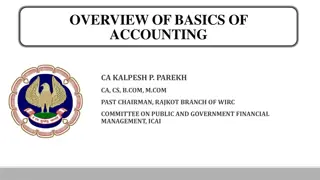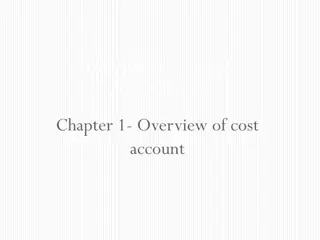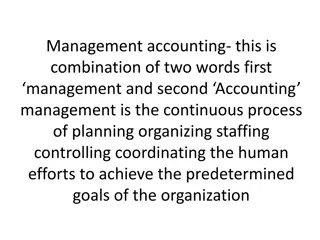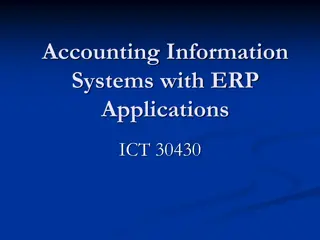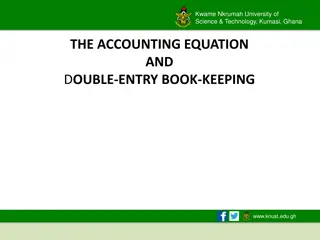Understanding Book-keeping and Accounting in Business
Book-keeping is the systematic recording of business transactions while accounting involves analysis, interpretation, and communication of financial information. Book-keeping is clerical and routine, done by bookkeepers, while accounting is analytical and requires specialized knowledge, handled by accountants. The scope, nature, and functions of book-keeping and accounting differ significantly, with book-keeping being the first stage and accounting building upon it. Both are crucial for understanding a business's financial performance and position.
Download Presentation

Please find below an Image/Link to download the presentation.
The content on the website is provided AS IS for your information and personal use only. It may not be sold, licensed, or shared on other websites without obtaining consent from the author. Download presentation by click this link. If you encounter any issues during the download, it is possible that the publisher has removed the file from their server.
E N D
Presentation Transcript
Book-keeping is a process of recording business transactions chronologically in a systematic and scientific manner in a separate set of books. Book-keeping is the first stage of accounting. This stage of accounting is mechanical and repetitive in nature. Essential features of book-keeping:- Book-keeping is an art as well as science Recording and classifying business transactions Recording in a separate set of books Recording in terms of money Recording chronologically Recording in a systematic manner Book-keeping helps in understanding the financial performance and position of the business.
BOOK-KEEPING- AS A PROCESS:- Book-keeping as a process includes the following steps; Identifying the transactions of financial character Measuring the transactions in terms of money Recording the transaction in the books of original entry Posting the transaction into ledger Balancing the account opened in the ledger and; Preparing trial balance
Book keeping an accounting are used in the same meaning, but in the real sense, they have adequate difference which is as under:
DIFFERENCE BETWEEN BOOK-KEEPING AND ACCOUNTING BASIS OF DIFFERENCE Scope Nature BOOK-KEEPING ACCOUNTING Scope of Book-keeping is narrow. The function of book-keeping is clerical and routine type in nature. Book-keeping includes recording business transactions, posting them into ledger and balancing of accounts. Scope of Accounting is broad. The function of accounting is analytical. Accounting includes not only the preparation of records, but also the preparation of summary statements and analysis, interpretation communicating the result to the users. It is the second Accounting. The accounting starts where the work of book-keeping ends. reports, their and Stages It is the first stage of Accounting. The work of bookkeeping starts when business transaction takes place. stage work of of
BASIS OF DIFFERENCE BOOK-KEEPING ACCOUNTING Who Perform This work is done by a person called bookkeeper. The work of bookkeeping is performed according the rule and regulations. Hence, there is no need to take personal judgement by a book-keeper. For book-keeping special knowledge and ability is not required. In present time, the work of book-keeping is done on computers. This work is performed by a person called accountants. a Personal Judgement The work of accounting is analytical in nature. Hence, the accountant has personal judgement to to take Special ability and Knowledge For knowledge required. It is due to this fact that company appoints only those accountants who have greater degree of skill and specialization in that is Chartered Accountants. Accounting ascertains financial position of the business. accounting special ability and is accounting Knowledge of Financial Positions Book-keeping throw any light on the financial position of the business. does not the
BASIS OF DIFFERENCE Dependency BOOK-KEEPING Book-keeping depend on accounting to make the records more effective and useful. A book-keeper responsible for accounting work. ACCOUNTING has to Accounting has to depend on book-keeping to get the record information on time. Responsibility is not An accountant is responsible for book-keeping work. It is because the task of book-keeping is done under his supervision. Although book-keeping differs from accounting yet it is a part of accounting. On the basis of transactions recorded and classified in book-keeping, the final accounts are prepared in accounting.






